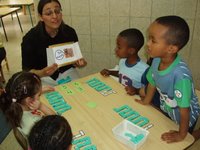We feel that we witnessed a response to a challenge beyond anything we've heard of. Israel is trying to absorb 105,000 people who come from isolated and totally primitive villages, who have now completely severed their ties with their original culture. When they came to Israel, 70% of the immigrants were illiterate. Now 55% of this community is 18 or younger, and their needs are unimaginable.
Unlike most other places who have admitted or brought in immigrants, the Israelis are making a heroic effort to have their immigrants learn language, culture, and become productive members of a first-world society. Both human resources and material resources on a large scale are deployed for this endeavor. No one knows how this effort will turn out, but we must express our admiration for the commitment.
Our visit was hosted by representatives of the Joint Distribution Committee, which sponsors PACT: Parents and Children Together. The goal of PACT is to help Ethiopian immigrants' children to reach elementary school with at least minimal learning skills and preparation.
At the three site visits, we learned about the programs within PACT. We saw a prekindergarten class -- about half of whom were Ethiopian -- learning about Jerusalem Day. We saw mothers in a class about child care. And we heard the personal and professional stories of three liaison workers who translate and interpret cultural ideas for the Ethiopian parents of small children.
Here is an example of the challenges to those who run the programs. One of the first things on a liaison workers' home vist to new parents is teach basic skills. New mothers and fathers themselves often need to learn such things as counting, using a scissors, and recognizing the letters of the alphabet, as well as basics of childcare. Ethiopian mothers typically use little language in caring for babies; their homes have no books, games,or educational toys, as the parents themselves have rarely attended school. The programs try to encourage parenting skills and improve their eventual relationships with children who will learn things that their parents never experienced.
At the preschool we watched 4 children and a teacher in an enrichment program that intensively teaches them to count, to express themselves, and to play games that prepare for kindergarten. The children were participating in a discussion of the Western Wall for Jerusalem Day, and playing a counting game with blocks that are commonly used for teaching elementary school arithmetic.

The enrichment teacher works closely with the preschool teacher to coordinate the programs and activities. The preschool is a state school, while the PACT program is funded by the Joint.
At the well-baby clinic, we saw the end of a program on "Summer Safety." The clinic nurse, through the liaison worker, was educating a group of Ethiopian young (and very young) mothers about the danger of allowing children under 10 to swim alone in the sea. Other topics for this group include dental and other hygiene for babies, nutrition, and basic safety, like not allowing small children to go into traffic.
At the community center, we met three Ethiopian immigrant women who serve as translators and cultural liaison workers. One of the three immigrated without her parents at the age of nine. She is now completing a university degree in sociology and counselling. The others came with family as teenagers. All attended boarding schools that provide intensive education for immigrants, though they said that when the started at the school they were sad and lonely.
We learned a great deal about this program and its dedicated staff. The challenge of educating this immigrant group is huge, and the workers are deeply dedicated.
No comments:
Post a Comment